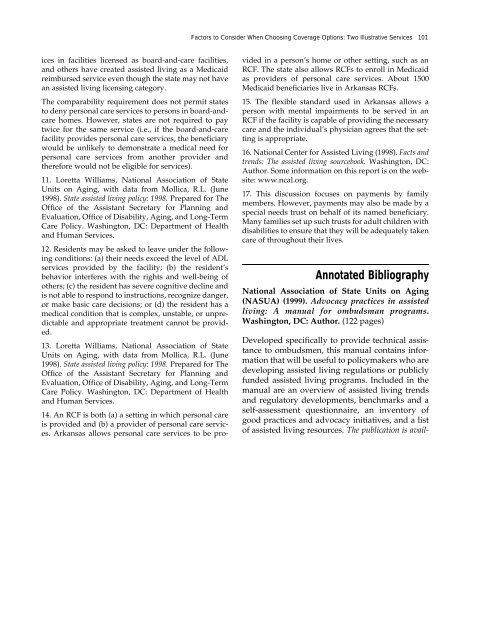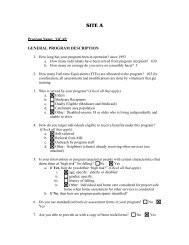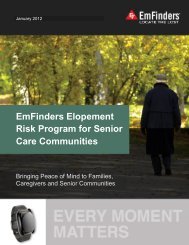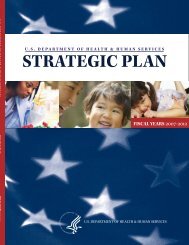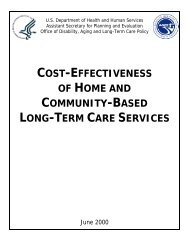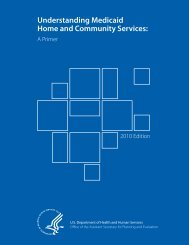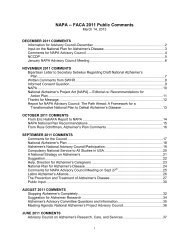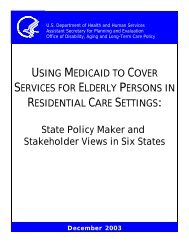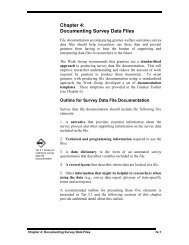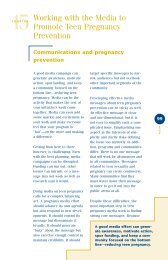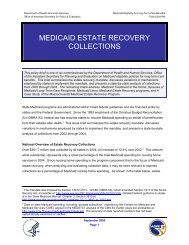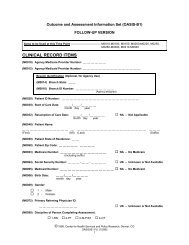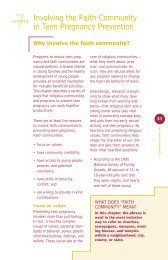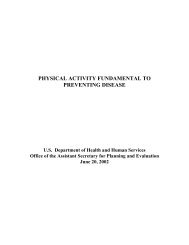Full PDF Version - ASPE - U.S. Department of Health and Human ...
Full PDF Version - ASPE - U.S. Department of Health and Human ...
Full PDF Version - ASPE - U.S. Department of Health and Human ...
- No tags were found...
Create successful ePaper yourself
Turn your PDF publications into a flip-book with our unique Google optimized e-Paper software.
Factors to Consider WhenChoosing Coverage Options: Two Illustrative Services 101ices in facilities licensed as board-<strong>and</strong>-care facilities,<strong>and</strong> others have created assisted living as a Medicaidreimbursed service even though the state may not havean assisted living licensing category.The comparability requirement does not permit statesto deny personal care services to persons in board-<strong>and</strong>carehomes. However, states are not required to paytwice for the same service (i.e., if the board-<strong>and</strong>-carefacility provides personal care services, the beneficiarywould be unlikely to demonstrate a medical need forpersonal care services from another provider <strong>and</strong>therefore would not be eligible for services).11. Loretta Williams, National Association <strong>of</strong> StateUnits on Aging, with data from Mollica, R.L. (June1998). State assisted living policy: 1998. Prepared for TheOffice <strong>of</strong> the Assistant Secretary for Planning <strong>and</strong>Evaluation, Office <strong>of</strong> Disability, Aging, <strong>and</strong> Long-TermCare Policy. Washington, DC: <strong>Department</strong> <strong>of</strong> <strong>Health</strong><strong>and</strong> <strong>Human</strong> Services.12. Residents may be asked to leave under the followingconditions: (a) their needs exceed the level <strong>of</strong> ADLservices provided by the facility; (b) the resident’sbehavior interferes with the rights <strong>and</strong> well-being <strong>of</strong>others; (c) the resident has severe cognitive decline <strong>and</strong>is not able to respond to instructions, recognize danger,or make basic care decisions; or (d) the resident has amedical condition that is complex, unstable, or unpredictable<strong>and</strong> appropriate treatment cannot be provided.13. Loretta Williams, National Association <strong>of</strong> StateUnits on Aging, with data from Mollica, R.L. (June1998). State assisted living policy: 1998. Prepared for TheOffice <strong>of</strong> the Assistant Secretary for Planning <strong>and</strong>Evaluation, Office <strong>of</strong> Disability, Aging, <strong>and</strong> Long-TermCare Policy. Washington, DC: <strong>Department</strong> <strong>of</strong> <strong>Health</strong><strong>and</strong> <strong>Human</strong> Services.14. An RCF is both (a) a setting in which personal careis provided <strong>and</strong> (b) a provider <strong>of</strong> personal care services.Arkansas allows personal care services to be providedin a person’s home or other setting, such as anRCF. The state also allows RCFs to enroll in Medicaidas providers <strong>of</strong> personal care services. About 1500Medicaid beneficiaries live in Arkansas RCFs.15. The flexible st<strong>and</strong>ard used in Arkansas allows aperson with mental impairments to be served in anRCF if the facility is capable <strong>of</strong> providing the necessarycare <strong>and</strong> the individual’s physician agrees that the settingis appropriate.16. National Center for Assisted Living (1998). Facts <strong>and</strong>trends: The assisted living sourcebook. Washington, DC:Author. Some information on this report is on the website:www.ncal.org.17. This discussion focuses on payments by familymembers. However, payments may also be made by aspecial needs trust on behalf <strong>of</strong> its named beneficiary.Many families set up such trusts for adult children withdisabilities to ensure that they will be adequately takencare <strong>of</strong> throughout their lives.Annotated BibliographyNational Association <strong>of</strong> State Units on Aging(NASUA) (1999). Advocacy practices in assistedliving: A manual for ombudsman programs.Washington, DC: Author. (122 pages)Developed specifically to provide technical assistanceto ombudsmen, this manual contains informationthat will be useful to policymakers who aredeveloping assisted living regulations or publiclyfunded assisted living programs. Included in themanual are an overview <strong>of</strong> assisted living trends<strong>and</strong> regulatory developments, benchmarks <strong>and</strong> aself-assessment questionnaire, an inventory <strong>of</strong>good practices <strong>and</strong> advocacy initiatives, <strong>and</strong> a list<strong>of</strong> assisted living resources. The publication is avail-


